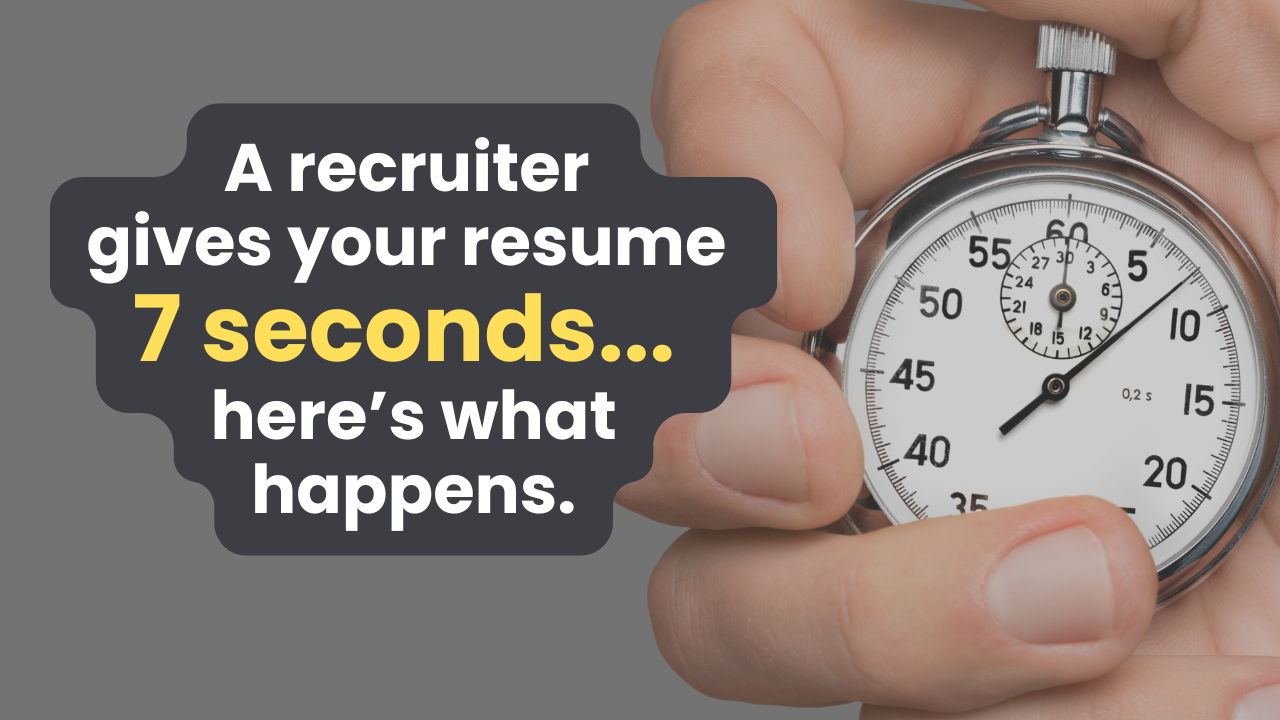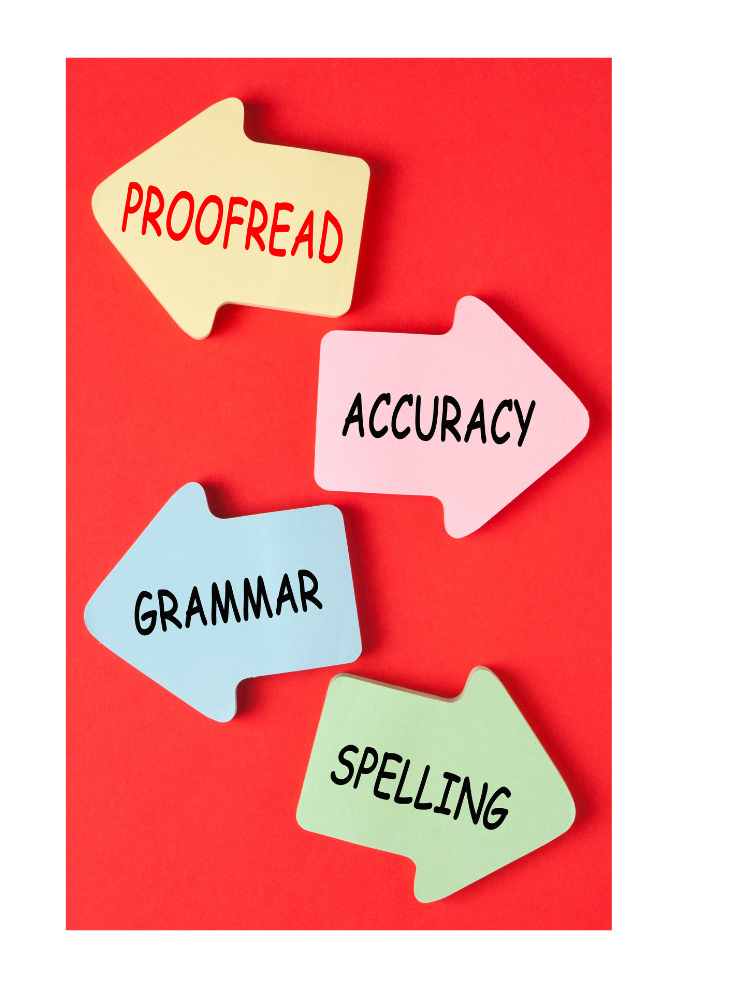
If you're lucky, your resume gets 7.4 seconds... here's what happens.
Did you know that recruiters spend only 7 seconds on their first look at your resume? That's not a long time, but it could be the most important seven seconds of your career because it's when they decide if you go into the reject pile... or they see things they're looking for and want to know more.
 I've reviewed tens of thousands of resumes in my decades of recruiting and job search coaching.
I've reviewed tens of thousands of resumes in my decades of recruiting and job search coaching.
In those years, I developed a finely tuned superpower for scanning quickly to find key information I need so I can decide if it's worth looking further.
How much can I learn about you in just a few seconds? A lot, honestly.
Enough to quickly and confidently weed out the resumes that definitely won’t work from those that are worth a deeper look.
I do it by focusing on a few key things that I can see in those seven seconds in order to make that call.
I can't speak for every recruiter obviously, but here's what goes on in my head.
 First, have you done what I'm looking for?
First, have you done what I'm looking for?
I am hoping to find people who have done the job before.
If I’m recruiting for a senior marketing manager for a tech startup, I'm looking for resumes from people who are currently senior marketing managers for a tech startup, or very close to that.
An experienced person will get up to speed faster, and bring a deeper understanding of the space and situation.
If I don't see the job titles or keywords I'm looking for, or the headline doesn't talk about marketing, and I don't see marketing language and experience, I'm moving on because that is not the marketing manager I'm looking for.
Tip: Use a headline that highlights what you do and reflects the job you’re applying to. Tailor it for every single job you go after so it's clear what you do, and If your previous jobs don’t match the target job, find a way to make it look like they do. (And if you can't do that, don't waste everyone's time applying for that job.)
Are there typos, misspellings or grammatical errors?
 Top candidates make sure their all-important marketing document (which is what your resume is... a marketing document about you) is perfect.
Top candidates make sure their all-important marketing document (which is what your resume is... a marketing document about you) is perfect.
I strongly believe that how you do anything is how you do everything, so if you have sloppy mistakes and errors in your super-important resume, then you're showing me that you are okay with sloppy work.
And that's a problem because I'm looking for excellence and high standards in every way.
Sure, humans make mistakes, but more than a couple of typos and I figure that if you don't care enough to make sure your resume is perfect, then I don't care either.
Tip: Proof twice. Do a spelling and grammar check. Then get someone else to proof it, too. Then proof it from the bottom to the top. Make it perfect.
Does it look modern?
To make a positive impression with innovative companies, you have to look modern.
 Companies want candidates who are up to date, so those old-school resumes your college gave you, with an objective, laundry lists of out-of-date software, those weird arrow bullets, overly formal language, or underlined Times New Roman headers make you look like you're living in the last century.
Companies want candidates who are up to date, so those old-school resumes your college gave you, with an objective, laundry lists of out-of-date software, those weird arrow bullets, overly formal language, or underlined Times New Roman headers make you look like you're living in the last century.
An old-fashioned resume makes you look old-fashioned, and that's never good.
Tip: Read up about the latest options for resumes and if you’re in a competitive field, get professional help. Your resume is a major piece of your personal branding and it's an investment that can pay off quickly in many ways. Few things transform your job search like a great resume, and transforming your job search means transforming your career.
Does the story it tells make sense?
Resume-speak and what I call "resume blah-blah" are hard to understand.
 The problem is usually the language is too dense or too technical because the writer thinks that professional writing is dry and formal, so they end up with a resume that isn't going to impress anyone.
The problem is usually the language is too dense or too technical because the writer thinks that professional writing is dry and formal, so they end up with a resume that isn't going to impress anyone.
Or maybe you relied on AI which gave you formulaic language just like everyone else.
But your resume is a personal story about you and it should tell your career story in simple, easy-to-understand language.
Don't muck up your resume with mysterious acronyms, forced statistics and metrics, dry corporate-speak, trite buzzwords and general trying-to-sound-important filler fluff.
When it's hard to read and hard to understand, it makes you hard to like.
Tip: Tell the story of your career in the clearest and simplest language possible. Human beings like and understand natural language, so don't be afraid to use it.
Does your personality come through?
 Reviewing and selecting candidates through resumes is complicated because a resume is a 2D representation of a real-live 3D human being, or at least it should be.
Reviewing and selecting candidates through resumes is complicated because a resume is a 2D representation of a real-live 3D human being, or at least it should be.
With the sheer volume of applications in today's market, even with the massive assistance of ATS systems for screening, you have to raise the bar with a strong and understandable resume where there is a sense of you as a person, so you are noticed and remembered.
Tip: Ballroom dancer? Environmental activist? Award-winning musician on the side? Founder of a values-driven organization? Don't be afraid to share a bit of the real you. It makes you more memorable and can be a way to let them know what's important to you.
Does the chronology work?
 Recruiters will always look to see how long someone was in their jobs, usually quickly scanning from the bottom up, looking to see if they got promoted, and if there are any as-yet-unexplained gaps or missing information.
Recruiters will always look to see how long someone was in their jobs, usually quickly scanning from the bottom up, looking to see if they got promoted, and if there are any as-yet-unexplained gaps or missing information.
These may not be dealbreakers, but the candidate with solid tenure and career progression might be more appealing for certain jobs.
So take a look at your own resume... how would it do in seven seconds with my criteria?
 Does it clearly say what you do, in language any business reader would understand?
Does it clearly say what you do, in language any business reader would understand?
Is it free from spelling, grammar and formatting errors?
Does it look modern and well organized?
Does it tell a strong story about your career progression, skills and personality?
Does it make someone want to talk to you to learn more about you and what you can do for them?
Then ask someone you trust to look at your resume quickly, too.
 One test I suggest is to print your resume and hand it to someone you know who might not know much about your career... tell them you'd like them to look at it for some fast and specific feedback, and count silently to seven seconds (or maybe 10 or 15 seconds since they're not professional resume readers) while they review it.
One test I suggest is to print your resume and hand it to someone you know who might not know much about your career... tell them you'd like them to look at it for some fast and specific feedback, and count silently to seven seconds (or maybe 10 or 15 seconds since they're not professional resume readers) while they review it.
Then take it back and ask them to tell you what they got in those seconds and what they think you're looking for.
If they don't get at least the basics right, your resume is not doing its work.
(Note, this is not about asking for feedback bout everything in your resume, which is usually not a great idea unless someone has a great deal of hiring experience in your field. You are just checking to see if the resume is delivering the messaging you want.)
Be honest with yourself, and if you think resume falls short, do some upgrading and polishing to bring it up to snuff so it stands out in that sea of not-worth-the-time-to-read competition.
Because the good news is that it's really not that hard to create a resume that represents who you are in a way that stands out from the crowd and still feels 100% you.
Are you ready to get your job search on?
Join my mailing list to get updates and notice of new courses and other resources for your job search!
Your email is safe with me. No spam, ever. If you ever get an email you don't want, just click the unsubscribe. I won't be mad, promise.







